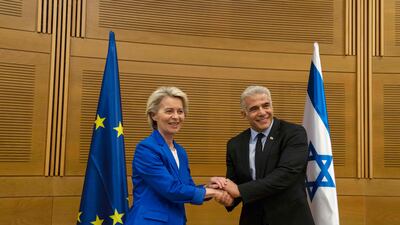European Commission President Ursula von der Leyen and Italian Prime Minister Mario Draghi began meetings in Israel on Monday as the EU seeks to do without Russian fossil fuel imports.
The leaders embarked on energy talks with Israel, which has turned from a natural gas importer into an exporter in recent years because of big offshore discoveries.
Ms Von der Leyen was scheduled to meet Israeli Prime Minister Naftali Bennett on Tuesday, with talks expected to focus “in particular on energy co-operation”, an EC statement said.
On Monday, she met Foreign Minister Yaid Lapid, who said in a statement that Israel's ties with the EU were a “strategic asset”.
She later met Energy Minister Karine Elharrar, whose representative told AFP Ms Von der Leyen reiterated “the EU need for Israeli gas.”
Mr Draghi, on his first Middle East trip since taking office last year, will also discuss energy and food security during his two-day trip, Italian media reported.
He was also scheduled to meet Mr Bennett on Tuesday, the prime minister's office said.
Speaking at a synagogue in Jerusalem shortly after landing, Mr Draghi said his government was “committed to strengthening the memory of the Holocaust and to fighting against discrimination of all kinds against Jews”.
Mr Draghi later met Mr Lapid, with the foreign minister's office saying the “two discussed strengthening and deepening ties between Israel and Italy, the geopolitical situation after the war in Ukraine, and co-operation between their two countries.”
Mr Draghi and Ms Von der Leyen will on Tuesday meet Palestinian prime minister Mohammad Shtayyeh in the Israeli-occupied West Bank.

The EU this month formally adopted a ban on most Russian oil imports, its toughest sanctions yet over the war in Ukraine.
Ms Von der Leyen has said the bloc hopes to end its dependence on Russian hydrocarbons, including gas, by 2027.
Mr Draghi and other EU leaders said that European customers may need price protection as energy costs continue to rise.
Ms Elharrar and other Israeli officials said their country could help meet EU demand if it can deliver gas from its offshore reserves estimated at nearly 1,000 billion cubic metres.
Before Ms Von der Leyen's visit, European Commission spokeswoman Dana Spinant told reporters to “stay tuned for announcements that we are going to make on energy co-operation with Israel and other partners in the region”.
For now, getting Israeli gas to Europe is fraught with challenges and would require major and long-term infrastructure investments.
With no pipeline linking its offshore fields to Europe, one option for now is piping natural gas to Egypt, where it could be liquefied for export by ship to Europe.
Another possible scenario to build a pipeline to Turkey.
Israel's ties with Ankara have thawed after more than a decade of diplomatic rupture and experts have said Turkey's desire for joint energy projects has in part led to its reaching out to Israel.
That pipeline project would take $1.5 billion and two to three years to complete, according to Israel's former energy minister Yuval Steizitz, now in opposition.
Option three is known as the EastMed project, a proposal for a sea floor pipeline linking Israel with Cyprus and Greece.
Experts have, however, raised concerns about the cost and viability of the project, while Israel has said it would like to see Italy sign on.
A representative of the Israeli energy minister told AFP on Monday that there have been talks since March to create an agreement or legal framework to take Israeli gas to Europe through Egypt.
Further complicating Israel's offshore gas production is a long-running maritime border dispute with Lebanon.
The neighbours technically remain at war but have agreed to US-mediated talks aimed at delineating the border to allow both countries to boost exploration.
Talks broke down last year but Israel has urged Lebanon to re-engage.
Tensions flared this month following a Lebanese claim that Israeli production was taking place in contested waters.
Israel said that the area was clearly south of the disputed zone.
The US envoy mediating the maritime border talks, Amos Hochstein, was expected in Lebanon on Monday.

